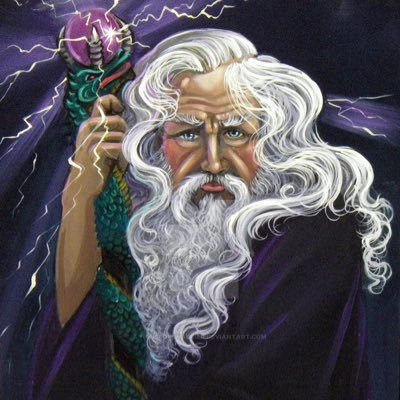What makes a mystic and what makes a magic user? Up until this point there was some sort of line between the two such as the difference between a midwife sacrificing her child to Satan to understand the future and Margery Kempe crying because of her visions in public. One was influenced by God himself and the other was for more selfish means. But where does that leave Merlin? Clearly he has abilities to see prophesied events, but one part really stuck out to me that made me think the magic vs. mystic line was muddied:
"...I am the son of a demon who seduced my mother...He gave me the ability to know all things said and done in the past and that is how I know what life your mother has lead. Our lord wanted me to have that memory because of my mother's virtue and her true repentance, and because of my own submission to the commandments of the Holy Church...granted me the power to know the things that are to come."
So...he's the son of a demon and knows the past...but also knows the future because he's aligned himself with God...can he pick one? But, in my own view this muddies up the line between magic and mysticism again. Yes, it's true Merlin woks under God, but what about the gray area BEFORE he joined the church? Much to think about...Maybe the truth is that Merlin is both and can be both because of who he is?
Pages
▼
Tuesday, November 5, 2019
Magic or Mystic?
Merlin got his ability to know the past from Satan, making him a witch who uses magic. However he then has the ability to know the future, which he got from God, making him a mystic. Since he has both abilities from different sources what would Merlin be? A witch or a mystic? What would he be tried as?
blessing or a curse?
“In this way the boy knew the things of the past through the
devil, and the knowledge of the future came to him from God, who thus wanted to
counterbalance the other’s work. Let the boy, then, decide which way to turn:
to choose the Devils path or our Lords.”(309)
Was this ability God gave him going to be a blessing or a
curse. It is a big responsibility and can be a lot to handle having “knowledge
of the future”.
Why did God decide to keep his “gift” of knowing things of
the past when it came from the devil. Did God want Merlin to have this temptation,
so he could choose God? Did God have that much confidence in Merlin, where he knew he would choose good?
God had the ability to take away the "gift" from the devil, so why wouldn't he?
Music for Merlin
I really like to listen to instrumental music while writing or reading. While I read this long reading on Merlin, I was listening to the Game of Thrones soundtrack, and found the tone to be very fitting. This song especially was a joy to listen to towards the end of the reading, with the quote:
"His cry came from the pain he felt when he realized that he was being killed by a woman's cunning and that a woman's craft had defeated his own. The echo of the cry was heard throughout the length and breadth of the kingdom of Logres..."
Nothing better than a woman defeating a man who thinks he knows everything! To make this song even more befitting (for any GoT fans), this is the song that was playing during the scene where (SPOILER ALERT) Cersei killed off a massive amount of people in a church to save herself. This super long song has a super slow beginning that builds to a great climax of instrumentals, so if you're going to play it in class, I would recommend starting around 8:15 to see how grand it gets!
Monday, November 4, 2019
So. Much. God.
The author of Prose Merlin does a really good job of including God as a character of this story of Merlin to reconcile religion with supernatural. God is literally everywhere as a way of telling the reader, “Hey, I know a lot of weird stuff is happening. But that doesn’t change the fact that we’re super Christian. Super. Christian.” Some of this is demonstrated just in the dialogue. On page 310, a woman says, “unless God puts it right.” On page 341, there’s a “God willing...” And, on page 350, Queen Helaine is the most beautiful and worthy woman “know to either God or man.” And there are SO many more examples. Basically, these moments of referencing God show that no matter what is happening, God is at the forefront of everyone's mind, and that is why they’re able to accept Merlin’s supernatural abilities. It’s explained over and over: “[Merlin has] knowledge of all things done and said in the past and that it comes to [him] from [his] demonic origin. Our Lord, who is all-powerful, has also given [him] the wisdom to know the things that are to come” (327). Every time this is mentioned, I imagine the writer saying, “MERLIN ISN’T SPECIAL. YOU KNOW WHO IS SPECIAL? GOD’S SPECIAL.” Because even though there is some demonic stuff going on, God is always presented as the stronger of the two. Demons gave Merlin “knowledge;” God gave Merlin “wisdom.” There’s a difference. By saying “demonic origin,” there is an absence of action. In comparison, God “has given” Merlin his ability, which casts God into more of an active role. Also, Merlin doesn’t just say, “God gifted me this cool thing.” He has to add in that side note, “WHO IS ALL-POWERFUL," in case people forget that God’s a big deal.
Magic or Mysticism?
In reading “The Prose Merlin” the reader can clearly see that Merlin is capable of doing some pretty magical things. He speaks only a few months after birth, moves some heavy stones, and predicts the future. Despite being the son of a demon, he attributes his abilities to God. For it is He who gifted Merlin the ability to know the future in order to prevent him from serving the devil. Despite his evil father, Merlin is saved from Hell by God. In fact, this is not the only time religion comes up. It appears later in Merlin’s making of the third round table where he says that in its creation, the Trinity will be represented (328). It is also spoken about the empty space left at the round tables to represent the spot for Judas who turned his back on Jesus during the Last Supper. With all the religious shadowing in the text, it creates a larger idea. That Merlin is not some magical man whose powers come from an unknown source. Instead, it creates the idea that perhaps like Margery Kempe or Julian of Norwich that he is a mystic. Everything that he sees is by the grace of God. Overall, this allows to author to show the idea that everything that happens in the world is by the grace of God and not magic or the will of the devil.
Merlin's Foreshadowing
The analogy of the lake of Diana is clearly foreshadowing for future events that happen between Merlin and the Lady of the Lake. The way Faunus dies parallels the way Merlin meets his end at the end. If I had to guess who Felix represents I would say it is Lancelot since she seems taken by him as a child when she meets him in the tower where she talks to Lancelot's mother. Now, as to who the father of Faunus would parallel I can't say. It could be Arthur that eventually seeks out vengeance for Merlin's death or it could be a character not introduced in the reading. I think it's really interesting that Merlin was the one to deliver the foreshadowing to his own death, because, as the reader, it was kind of frustrating to see someone with so much foresight not see that his own story was a story of his own demise. But I guess that's the point, his heritage, his reliance on his foresight, and his human vices were all used against him... in the end he was his own weakness.
A 2-year-old lawyer....? Nah that's not weird or anything
Okay, so why did they just blow over the fact that Merlin was only 18-months-old when he started to defend his mother in court? That's just not a normal thing that happens and people are only a little bit surprised. Also they really just let a two-year-old be his own mothers lawyer, cool.


